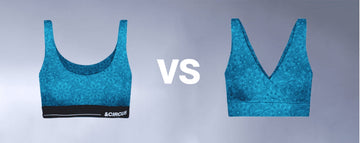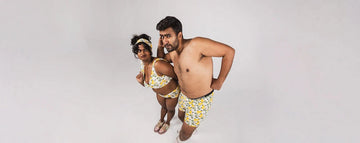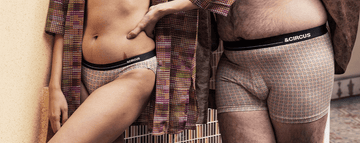Imagine the quiet luxury of sliding into underwear that cradles your body without a whisper of discomfort, or draping yourself in loungewear that invites endless hours of relaxation. Now, envision that same indulgence carrying a lighter burden on the Earth fabrics born from innovation that prioritize both your well-being and the planet's. As fast fashion's grip loosens, a new era emerges where sustainable textiles redefine daily comfort. Brands like AndCircus stand at the forefront, demonstrating that true elegance lies in harmony between human needs and environmental stewardship.
Uncomfortable underwear shouldn't steal your confidence. At Andcircus, we craft ultra-soft, sustainable Lenzing Modal Micro® innerwear for every body, XS to 5XL. From briefs to bras, our custom packs fit you perfectly. Shop risk-free with our 100% satisfaction guarantee and embrace comfort that includes everyone. #LoveEveryBody. Shop Now!
The Impact of Fabric Innovation on Daily Comfort Levels in Sustainable Fashion
In today's relentless pace, comfort isn't a luxury it's essential. From the foundational layer of all-day underwear to the soothing embrace of evening loungewear, what we wear against our skin shapes our experience. AndCircus, a trailblazer in inclusive and sustainable apparel, responds to this imperative with textiles that transcend mere functionality. Their ethos revolves around creating garments that deliver unparalleled tactile pleasure while minimizing ecological harm. At the heart of this transformation is fabric innovation, a force propelling eco-aware consumers toward a future where daily wear enhances life without exhausting resources.
The surge in sustainable fashion reflects a profound shift in collective consciousness. No longer content with transient trends, buyers seek attire that resonates with their principles clothing that nurtures the body and safeguards the environment. Projections indicate the global sustainable fashion market will reach USD 10.09 billion in 2025, expanding to USD 24.99 billion by 2035 at a compound annual growth rate of 9.49 percent. This trajectory underscores a burgeoning demand for materials like organic cotton and recycled polyester, propelled by breakthroughs in textile engineering and a unified call for planetary preservation. These evolutions aren't abstract; they manifest in fabrics that breathe, adapt, and endure, turning everyday essentials into allies for both personal ease and global health.
Revolutionizing Textiles for Comfort and Sustainability
The textile sector is witnessing a seismic yet understated upheaval, dismantling the old trade-offs between ease, aesthetics, and ecological integrity. Contemporary fabrics boast intelligence and versatility that were once the stuff of science fiction. Consider moisture-wicking synthetics that banish sweat from your morning rush, or plant-derived weaves like bamboo that deliver a perpetual whisper of coolness. Synthetics, too, are shedding their tarnished reputation through recycled variants that slash plastic waste without forfeiting resilience.
Among the most audacious advances is bio-fabrication, where laboratory-cultured fibers replicate cotton's plushness minus the voracious water demands of traditional farming. Smart textiles, infused with sensors for thermal modulation or stain resistance, elevate routine garments to proactive companions. Hybrid compositions merge nature's bounty with synthetic prowess, yielding blends that excel in tactile allure and operational efficacy. These strides extend beyond sensory delight; they mitigate the fashion realm's outsized environmental levy. Energy-thrifty production methods and compostable compositions are curbing emissions and waste, fostering a cycle where innovation serves sustainability as much as style.
Take organic cotton, for instance a cornerstone of this renaissance. Unlike its conventional kin, which guzzles irrigation, organic variants demand 91 percent less water, preserving aquifers and curbing pollution. This isn't hyperbole; it's a quantifiable leap that allows fields to thrive on rainfall alone, slashing the carbon footprint tied to pumping and distribution. Similarly, recycled polyester diverts bottles from landfills, emitting 75 percent fewer CO2 equivalents during manufacture compared to virgin production. Such metrics illuminate why these materials are not mere alternatives but imperatives for a viable wardrobe.
From Concept to Wearable Comfort
AndCircus embodies this paradigm, translating theoretical triumphs into tangible bliss. Their lineup champions organic cotton, which not only conserves water and eschews pesticides but also outperforms in moisture management, ensuring dryness through extended wear. Bamboo integrations add a layer of silken sustainability, their inherent porosity ideal for loungewear that envelops without ensnaring. These choices transcend benevolence; they're engineered for authenticity fabrics that anticipate the body's rhythms, from subtle shifts in humidity to the demands of diverse physiques.
Recycled polyester anchors their durable, featherlight offerings, transforming post-consumer waste into threads that rival the new. This approach mirrors industry-wide partnerships with pioneers in green textiles, where quality remains uncompromised. AndCircus's ethos of inclusivity shines through tailored fabric selections: elastane-infused weaves for mobility, hypoallergenic surfaces for the sensitive. No longer confined to uniformity, comfort becomes bespoke, accommodating every contour and preference with precision and grace.
Bamboo's appeal is particularly compelling. As a rapidly renewing resource, it demands no pesticides and regenerates swiftly, positioning it as an eco-champ among fibers. Yet, its mechanical processing eschewing harsh chemicals amplifies these virtues, yielding a fabric that's as gentle on skin as it is on soil. In AndCircus's hands, such elements coalesce into collections that feel intuitively right, proving innovation's power to democratize delight.
Navigating the Complexities of Textile Innovation
Yet, this ascent is fraught with formidable obstacles. Scaling eco-fabrics demands navigating a labyrinth of supply chains, where organic cotton's rigorous certifications inflate costs and bamboo's potential for chemical-laden viscose processing threatens its green credentials. Balancing premium quality, tactile superiority, and accessible pricing tests even the most resolute innovators. Extended gestation periods for sustainable yields exacerbate strains in an industry attuned to velocity, often bottlenecking responsiveness to market pulses.
Tenacity under duress poses another gauntlet. Emerging plant fibers may falter against the rigors of perpetual laundering, especially in intimates subjected to relentless cycles. Recycled synthetics, for all their promise, invite scrutiny over enduring viability do they truly eclipse their progenitors, or merely greenwash the status quo? The textile trade's voracious thirst accounting for 20 percent of global industrial water pollution underscores these perils, compelling brands like AndCircus to vigilantly audit every thread. Moreover, synthetic laundering unleashes over 500,000 tonnes of microplastics annually into oceans, a stark reminder that sustainability's path is as winding as it is worthy.
These frictions demand ingenuity: closed-loop systems that recapture effluents, or hybrid sourcing that mitigates vulnerabilities. For AndCircus, confronting these head-on fortifies their narrative, transforming potential pitfalls into proofs of commitment.
Fabric Innovation as a Competitive Advantage
Undeterred by hurdles, textile ingenuity emerges as a linchpin in a saturated arena. For discerning patrons, a marque's pledge to verdant weaves is a clarion call, forging allegiance among those who prize ethics alongside ergonomics. AndCircus harnesses this, cultivating a devoted cadre that views their patronage as principled investment. Such fabrics don't merely augment wear; they distinguish in fast fashion's deluge, where disposability reigns.
The cascades are profound. Verdant materials optimize fabrication, paring refuse and vigor closed loops reclaim fluids and reagents, diminishing ecological scars. These gains transcend altruism; they economize long-term, democratizing sustainable splendor. As appetites swell mirroring the market's 9.49 percent annual ascent pioneers in fiber forge enduring bonds and bolstered prestige.
The horizon beckons broadly. Envision athleisure that intuits thermal flux or professional garb melding decorum with diurnal solace. Amplifying these across spectra, AndCircus and kin recast apparel as ethos incarnate, where each donning affirms values etched in every filament.
The Road Ahead for Sustainable Comfort in Fashion
Gazing forward, fabric's frontier gleams with techno-sustainable synergy. Savants foresee AI-orchestrated evolution, birthing bespoke weaves attuned to idiosyncrasies from metric precision to somatic serenity. 3D knitting, birthing seamless constructs with scant squander, accelerates this vista, slashing detritus while customizing to whim. Bio-mimicry and algal derivations herald attire as adaptive as it is benign, heralding an epoch of utilitarian elegance.
AndCircus must redouble vows to verdure and breadth, venturing into phycocyanin strands or degradable polymers to propel the fold. Yet, the onus extends to us: electing wares that exalt ease and ecology galvanizes metamorphosis. In this dialectic, consumer agency amplifies innovation's echo.
As you enfold in verdant underthings or recline in conscientious repose, ponder: each selection reverberates. A modest gesture, yet woven into a tapestry grand where tactile joy, aesthetic verve, and terrestrial tending entwine inextricably. AndCircus et al. illuminate this trail, affirming that our vestments can soothe, sustain, and splendorize in unison.
Frequently Asked Questions
How do sustainable fabrics improve daily comfort compared to traditional materials?
Sustainable fabrics like organic cotton and bamboo offer superior comfort through enhanced moisture-wicking properties, breathability, and hypoallergenic surfaces. Organic cotton provides better moisture management for all-day wear, while bamboo's natural porosity creates a silken feel that's ideal for loungewear. These innovative materials anticipate your body's rhythms and adapt to different physiques, delivering personalized comfort without compromising environmental responsibility.
What are the main benefits of organic cotton and recycled polyester in sustainable fashion?
Organic cotton uses 91% less water than conventional cotton while eliminating harmful pesticides, making it both eco-friendly and gentler on skin. Recycled polyester diverts plastic bottles from landfills and produces 75% fewer CO2 emissions during manufacturing compared to virgin polyester. Together, these materials create durable, comfortable garments that significantly reduce environmental impact while maintaining the quality and performance you expect from premium textiles.
Are sustainable fabrics as durable as conventional materials for everyday wear?
Yes, modern sustainable fabrics are engineered to match or exceed the durability of conventional materials through innovative textile technologies. Bio-fabricated fibers replicate cotton's softness without the environmental costs, while hybrid compositions blend natural and synthetic elements for optimal performance. However, some emerging plant fibers may require careful maintenance, and brands like AndCircus continuously audit their materials to ensure long-lasting quality that withstands regular laundering and daily use.
Disclaimer: The above helpful resources content contains personal opinions and experiences. The information provided is for general knowledge and does not constitute professional advice.
You may also be interested in: Why Eco-Friendly Bras and Panties Are the New Standard in Intimates
Uncomfortable underwear shouldn't steal your confidence. At Andcircus, we craft ultra-soft, sustainable Lenzing Micro Modal innerwear for every body, XS to 5XL. From briefs to bras, our custom packs fit you perfectly. Shop risk-free with our 100% satisfaction guarantee and embrace comfort that includes everyone. #LoveEveryBody. Shop Now!







































